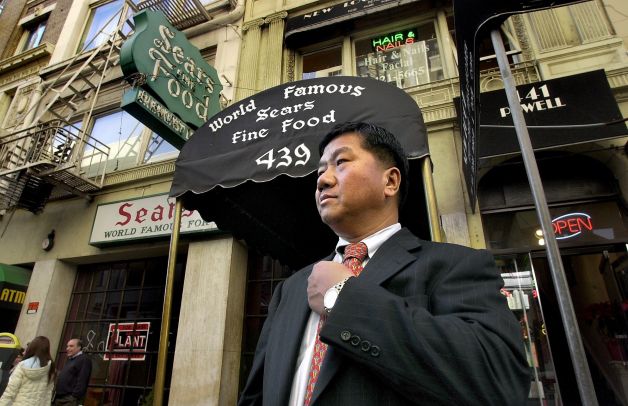Saturday, June 21, 2014, San Francisco Chronicle
“Why Korean War won’t be forgotten in S.F.”
by Carl Nolte, Reporter
Man J. Kim, owner of Sears Fine Food, is behind an effort to put up a Korean War monument in S.F.
By Carl Nolte
June 21, 2014
It was a cold winter’s night during the Cold War long ago, and I was a soldier on guard duty, walking my post along a razor wire fence that separated our U.S. Army compound from the steep barren hills of Korea.
I met another sentry where our posts crossed. We were both Californians, dismayed by the below-zero nights and the icy winds. We were draftees, appalled by the mind-numbing routines of the Army. We stopped to talk.
“I’ve been thinking,” the other guy said. “Look at this God-forsaken place. Just look. Was it worth it to have a war here? Is it worth it to have a bunch of sorry-ass GIs like us walking guard in the middle of the night? Why are we here? This country will never amount to anything. What a waste of time.”
‘Frontier of freedom’
He had a point. The Korean War had been over for a few years by then. But American soldiers were still in Korea, like an insurance policy, to keep the North Koreans at bay. “Men,” one officer told us, “we are on the frontier of freedom.” We thought that was pretty funny.
The South Korea outside our gates was a mess. The war had smashed everything and now it was one of the poorest countries in the world. The Korean idea of technology then was a three-man shovel; there was no industry, hardly any paved roads. There was only one elevator in the entire country, we were told, and it was in the Bando Hotel in Seoul.
The town of Uijongbu, just down the dusty road from our compound, had changed hands four times during the war, and it had been worked over by artillery.
There had been a large factory there once, but all that remained was a ruined smokestack. One of the famous sights was a house where the walls were made of flattened beer cans.
South Korea was a beautiful country, in its way, with mountains as jagged as broken bottles. The famously tough climate bred tough people. But we thought it was a hopeless place. We were glad to leave.
I mention all this because Wednesday is the anniversary of the day the war began. Most people have forgotten the Korean War – or if they remember it at all they note that it ended in a stalemate. It is a bad memory, like Vietnam, or Iraq.
A capital of high tech
But that’s a mistake to think that way. Our intervention in Korea, and our presence there even now, made a big difference.
Korea has been transformed; Seoul, the capital, has a forest of high-rises. It is a capital of high tech, one of the most wired cities in the world. Korean product names are famous: Samsung, Hyundai, Hanjin, Daewoo. In 1960, the average per capita income was $79. Now it has the 15th-largest market economy in the world.
Uijongbu, the town nearest our old Army compound, now has nearly 500,000 people, and is linked to Seoul by subway. It also has an elevated metro rail line with 15 stations. You could look it up on the Internet.
The American-led intervention in the Korean War, of course, did not produce this economic miracle. But it did give South Korea the chance to show what it could do. An alternate vision of Korea is just across the demilitarized zone – North Korea, a country that resembles a prison.
It is easy to forget this. Man J. Kim, a San Francisco businessman, has not forgotten his homeland.
He remembers when he was a boy walking to school on a dusty road near Pusan. A passing U.S. Army truck slowed down, and a soldier threw him something.
“It was a carton of milk,” Kim said. “I still think of how delicious it was. I had never had milk in my life before.”
Kim immigrated to the United States in 1972.
“This is the best country in the world,” he said.
‘Star of the Orient’
Kim is an American success story. He now has a string of businesses, including Sears Fine Food on Powell Street and Lori’s Diners.
He and American veterans of the Korean War are raising money to build a monument to the war in the Presidio of San Francisco. Their goal is $3.4 million; with a gift of $1 million from the Korean government, they are two-thirds of the way there.
“We want to remember how Americans saved Korea, and how now it is the shining star of the Orient,” he said.
Carl Nolte is a San Francisco Chronicle columnist. His column appears every Sunday. E-mail: cnolte@sfchronicle.com
This article originally appeared in the San Francisco Chronicle on June 21, 2014: http://www.sfgate.com/bayarea/nativeson/article/Why-Korean-War-won-t-be-forgotten-in-S-F-5570168.php?cmpid=hp-hc-bayarea


